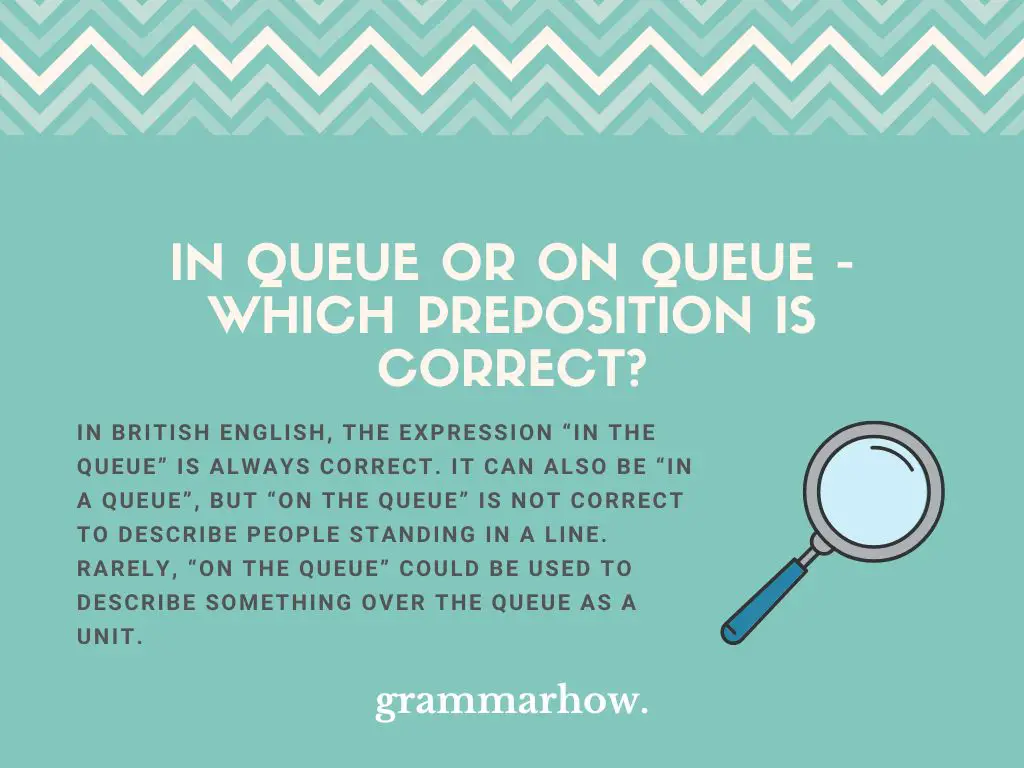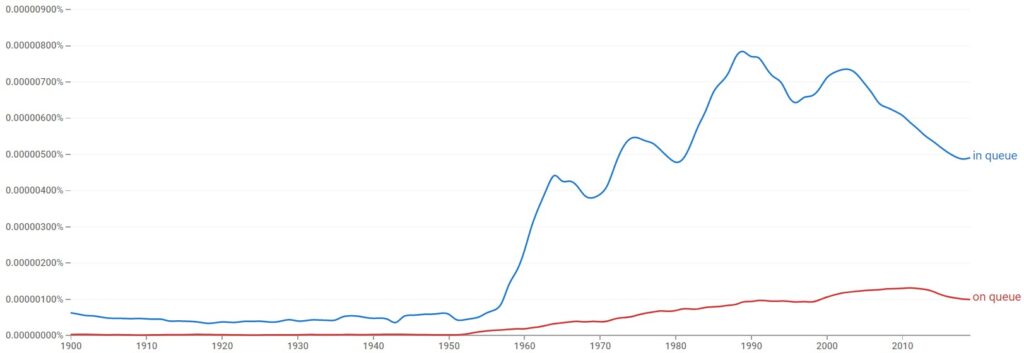Both phrases “in queue” and “on queue” are in use, but do they convey the same meaning? Are they both correct, and, if so, when do we use them and why?
In Queue or On Queue – Which Preposition Is Correct?
In British English, the expression “in the queue” is always correct. It can also be “in a queue”, but “on the queue” is not correct to describe people standing in a line. Rarely, “on the queue” could be used to describe something over the queue as a unit.

The phrase “in the queue” to describe people waiting for a service is rarely used in the United States; the preferred expression is “standing in line”.
“On queue” may appear as a misspelling of the expression “on cue”, which refers to an actor’s prompt in a stage play. “On the queue” and “in the queue are not interchangeable”
Here’s how to use “in the queue” and “in a queue” in a sentence:
- I wanted to buy a ticket for the concert but there were too many people already waiting in the queue.
- I met my sister’s friend in the queue for the opening of the January sales.
- He called to say that he will be late for the meeting; he is stuck in a queue of traffic near King’s Cross Station.
- The flight attendants began checking our boarding passes as we were standing in the queue to board the flight.
- Why is it that the other queue always seems to be moving faster until you swap queues?
- She is standing in a queue of more than fifty angry customers, waiting to find out what has happened to her order.
On Queue
In certain circumstances, when we are referring to the “queue” itself, as opposed to a member of the queue”, it can be correct to describe something above as being “on the queue”. For instance, “the sun shone on the queue”, meaning “the sun shone on the people in the queue”:
The use of “on queue” can sometimes be used to refer to something that is held up in a line, waiting to be actioned or delivered, for example an item in a print queue. This is still more properly referred to as “in the queue”.
Incorrect use of “on queue” could have arisen from confusion with the expression “on cue”. A “cue” is an appointed time or stage prompt to an actor to appear on stage..
Here are some examples of how to use “on the queue” and “on cue” in a sentence:
- The pot of paint fell off the ladder and landed on the queue of customers outside the pharmacy.
- Even as a heavy snowfall fell on the queue, everyone was so determined to get their new passport, and so nobody moved.
- The first batch of 500 copies is on queue to be printed later this evening.
- The worst possible outcome would be for the roof to fall on a queue of visitors.
- She looked out of the hotel window and her eyes fell on the long queue of people waiting to hear her sing that afternoon.
- The security guards were summoned to enforce order on the queue of passengers waiting to board the ship.
- Just as we were speaking about him, he arrived; right on cue!
Which Is Used The Most?
The data reported by the Google Ngram Viewer indicate that the expression “on queue” was virtually unheard of prior to 1950. It is hardly surprising that the phrase “in queue”, as the correct expression, is used the most.

However, it is surprising to discover that the use of the phrase “on queue” has increased steadily so that it appears once for every 5 times that “in queue” is used.
Whether the use of “on queue” has appeared through incorrect usage or confusion with the expression “on cue” is not determined.
Is It “In My Queue” or “On My Queue”?
Although “on my queue” is heard, the correct phrase to use in British English is “in my queue”. The word “queue” is not often used in the United States to describe people waiting in line, and so it can only be assumed that “on my queue”, though grammatically incorrect, is slowly creeping into common usage.
The use of “on my queue” would be restricted to an obscure usage where something rested on or appeared above the queue as a unit.
For example:
- The people waiting in my queue seemed to be moving very slowly, and so I moved to the other queue.
- I passed the time by observing the behaviour of the impatient shoppers waiting to be served in my queue.
- The inspectors decide to impose the new safety regulations for minimum distances on my queue.
You may also like:
Queuing or Queueing: Which Spelling Is Correct? (UK vs. US)
“Standing In Line” or “Standing On Line”: Which Is Correct?

Martin holds a Master’s degree in Finance and International Business. He has six years of experience in professional communication with clients, executives, and colleagues. Furthermore, he has teaching experience from Aarhus University. Martin has been featured as an expert in communication and teaching on Forbes and Shopify. Read more about Martin here.
